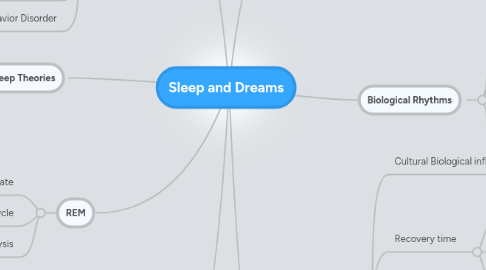
1. REM
1.1. Aroused State
1.1.1. Vivid Dreaming
1.2. 20 minutes per cycle
1.2.1. More as Sleep progresses
1.3. Body paralysis
2. Sleep Theories
2.1. Protects
2.1.1. Evolutionary - safer to sleep in dark
2.2. Recuperation
2.2.1. Rest & restore brain tissue
2.3. Consolidation of Memories
2.4. Creative Thinking
2.4.1. Dreams inspire innovation
2.5. Growth
2.5.1. Pituitary gland releases growth hormones
3. Sleep Disorders
3.1. Insomnia: Can't Fall asleep
3.1.1. Only problem if recurring
3.1.2. Caused by stress & other brain activity
3.2. Apnea: Breathing disruption
3.2.1. Causes high blood pressure & obesity
3.3. Narcolepsy: randomly fall into deep sleep
3.4. Night Terrors
3.5. Sleep Walking & talking
3.6. REM Behavior Disorder
4. What & Why We Dream
4.1. Negative Events
4.2. Environmental stimuli
4.3. Freud's Theory
4.3.1. Unconscious wishes
4.4. Neural pathways developed
4.5. Activation synthesis tehory
4.6. REM Rebound
5. Consciousness
5.1. Dual Processing
5.1.1. Conscious Awarness
5.1.2. Unconscious thinking
5.1.2.1. Subconscious processes
5.1.2.2. Unconscious processes
5.2. Selective Attention
5.2.1. Mindlessness
6. Biological Rhythms
6.1. Regulates
6.1.1. Hormone levels
6.1.2. Blood Pressure
6.2. Entrainment
6.2.1. Jet Lag
6.3. Endogenous (Internal)
6.4. Circadian Rhythms
6.4.1. 24 Hour cycle
6.4.2. Internal desynchronization
6.5. Rhythms of Sleep (90 minutes)
6.5.1. Stage 1: Alpha waves
6.5.2. Stage 2: Sleep Spindles
6.5.3. Stage 3: Slowed pulse & breathing
6.5.4. Stage 4: Delta waves
6.5.5. REM
7. Why We Sleep
7.1. Cultural Biological influence
7.1.1. Genetically influenced
7.1.2. Culturally influenced
7.2. Recovery time
7.2.1. Replenish body
7.2.2. Removes waste
7.2.3. Consolidate memories
7.3. Different for different ages
7.3.1. Babies need most
7.4. Consequences of Sleep Deprivation
7.4.1. Reduced Productivity
7.4.1.1. Mistakes
7.4.1.2. Less Concentration
7.4.1.3. Slower Mental Functioning
7.4.2. Gain Weight
7.4.2.1. Ghrelin (fat producing) increased
7.4.2.2. Leptin (fat burning) decreased
7.4.2.3. Cortisol (fat hormone) increases w/ stress
7.4.3. Immune cells suppressed
7.4.4. Aging signs (Act elderly)
7.4.4.1. Irritable
7.4.4.2. Loss of memory
7.4.4.3. Slowed Performance
7.4.4.4. Slowed Reaction times
7.4.5. Dangerous to operate Heavy Machinery
